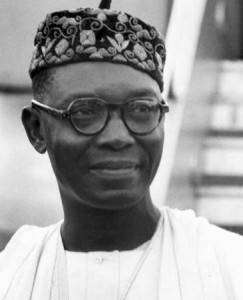Throughout the continent of Africa, the expression shown by tribes and different groups of people vary immensely. The typical thought of ‘art’ in the USA would be something along the lines of a painting in a museum but in Africa there are many forms. The expression of the artwork can vary between many styles and is almost always different. Many styles incorporate some form of wood, stone, glass, metal or paint. Starting in southern Africa working upwards through the continent you can find many works of art carved in stone, hillsides and caves. Towards the central parts of Africa you may see more body art involving beadwork, masks, paint and clothing related pieces. In the Northern parts of Africa many areas including Nigeria perform dances, perform music and ways of evoking creativity and participation. Art is expressed in many ways and Fela is so important to Africans because he uses a wide variety of techniques.
Fela Kuti, born in Nigeria in 1938 was one of the most influential African musicians on the continent. Fela’s tactics were a bit extreme at times but his message was always about the people. In his ‘afrobeat’ music, which is a mixture of jazz, highlife, funk along with some chanted vocals he would highlight ‘current’ events or things that have had a big impact on the country. Fela’s popularity took off in 1970 and continued for many decades. Fela often times would depict a certain event on his album covers that affected him in some way. One of his covers (“Alagabon Close”) depicts his wrongful incarceration and it shows him breaking free from the chains as a larger than life person while he is capsizing a police boat that is off of the close cliff. Another specific cover I thought was powerful along with being very meaningful was his song “Zombie” which depicts him standing up to the ‘zombie-like’ Nigerian soldiers who look like they’re not trying to help any situation but to destroy anything in their way. Fela although very talented did not create these abstract covers, he had some assistance. His artist was a Nigerian man by the name of Lemi Ghariokwu. Lemi and Fela had become friends through their acquaintance in early life. Fela allowed Lemi to create what he thought was a suitable depiction of the story Fela wanted to show and Lemi did it perfectly.
For Fela he produced less albums into the 1990’s and in 1997 Fela died from complications from the AIDS virus. In an article Lemi wrote he explains how he would not change anything during the time the produced the art. He supported Fela the whole way and thought it was the right thing to portray. Fela in fact attempted to run for president of Nigeria but his efforts were futile. Fela’s impact on Nigeria and Africa was immense. It opened the eyes of people and the surrounding countries of what was going on in Nigeria and the effect it had on the people.








